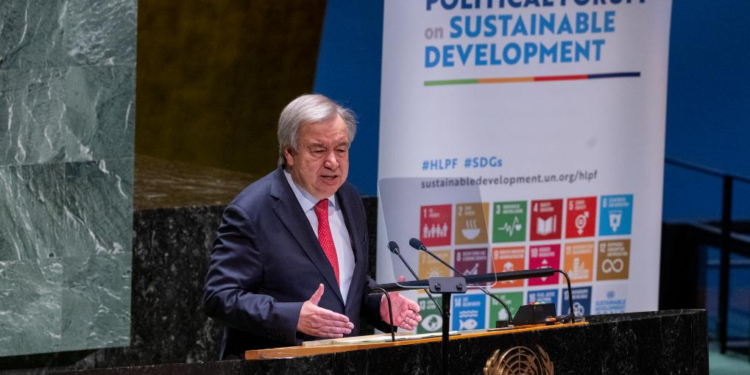A group of international humanitarian organizations have called for urgent action to end inequality if the world is to have any chance of meeting the Sustainable Development Goal 10.
UNAIDS (the Joint United Nations Programme on HIV/AIDS), Center for International Cooperation at the University of New York, Development Finance International and Oxfam, warned that without seriously tackling inequality, the world will not be able to end AIDS by 2030, alongside other communicable diseases under SDG 3.3. They also said that the Sustainable Development Goals (SDGs) on poverty, gender and education will be strongly compromised.
This call was made on Tuesday at the High-Level Political Forum (HLPF) on the SDGs at the UN headquarters in New York.
The organizations added in a statement that the COVID-19 pandemic led to high rise in equality between rich countries and poorer ones, which deprived the later of resources needed to deal with emergences like HIV/AIDS and COVID-19 itself.
“COVID-19 caused the largest rise in income inequality in three decades, as poorer countries lacked financing to support the incomes of the poor or to confront the COVID-19 and AIDS pandemics,” they said.
SDG 10, which calls for reducing inequality within and among countries, is one of the 17 goals established by the UN in 2015, which are expected to be met by 2030. Seven years to the deadline, concerns about the world meeting many goals affecting mainly poorer countries are rife.
The HLPF is a subsidiary UN body charged with reviewing the policy on the SDGs. Established in 2013, the Forum is convened every year under the auspices of the UN Economic and Social Council. It usually sets the stage for the SDG Summit organized under the auspices of the UN General Assembly.
The HLPF usually includes a ministerial meeting segment.
“The world is crying out for high-level political action — action to make the Sustainable Development Goals (SDGs) a reality — for everyone, everywhere,” UN Secretary-General Antonio Guterres said at the opening of the ministerial segment on Monday, urging every government to come to the upcoming SDG summit with clear plans and pledges to strengthen action in their countries.
In his Sustainable Development Report 2023, Guterres said that SDG 10 was one of the worst performing SDGs. He warned that almost 600 million people will remain mired in extreme poverty by 2030, greenhouse-gas emissions continue to rise, hunger is back to 2005 levels and gender equality is 300 years away, stressing the need for accelerated action, including through increased investments in sustainable development and climate action.
Campaigners say for the goal to be successful in reducing inequality, it is important that the international community takes concerted action during the current review of the SDGs which will culminate at the Summit scheduled for September 18-19, 2023.
According to UNAIDS and its partners, actions needed to be taken includes better monitoring the inequality of income and wealth within and between countries. This, they added, requires using indicators which are used by all member states and institutions including the UN or the World Bank, which are called the Gini coefficient and the Palma ratio.
HLPF 2023, which commenced on July 10 and is scheduled to close on Wednesday, July 19, is being held on the theme: “Accelerating the recovery from the coronavirus disease (COVID-19) and the full implementation of the 2030 Agenda for Sustainable Development at all levels”.
The forum provides a platform for participants to discuss the effective and inclusive recovery measures to address the impacts of the COVID-19 pandemic on the SDGs and explore actionable policy guidance for the full implementation of the 2030 Agenda and the SDGs at all levels, according to a statement from the UN in the run-up to the forum.
The 2023 meeting was also meant to review in-depth Goal 6 (clean water and sanitation), Goal 7 (affordable and clean energy), Goal 9 (industry, innovation and infrastructure), Goal 11 (sustainable cities and communities), and Goal 17 (partnerships for the Goals).
Seven African countries – Burkina Faso, Central African Republic, Comoros, DRC, Rwanda, Tanzania and Zambia – are among 40 countries offered themselves for voluntary national reviews of the implementation of their 2030 agenda during the forum.
Sierra Leone’s President Julius Maada Bio and his Namibian counterpart, Hage Gottfried Geingob, were named as having expressed their support and willingness to co-sponsor the call to action to Save SDG 10 and fight inequality during the conference this week.
In addition, over 230 leading global economists, political leaders and inequality experts, including former UN Secretary General Ban Ki Moon and former prime minister of New Zealand Helen Clark, published an open letter addressed to UN the secretary-general and the president of the World Bank, urging them to include the incomes and wealth of the rich in monitoring inequality by using Gini and Palma, and to ensure trends in inequality are monitored annually in all countries.
“This will allow the world to see the true picture of growing extreme inequality, and to strengthen its efforts to promote anti-inequality policies,” said the statement by UNAIDS and its partners.






















